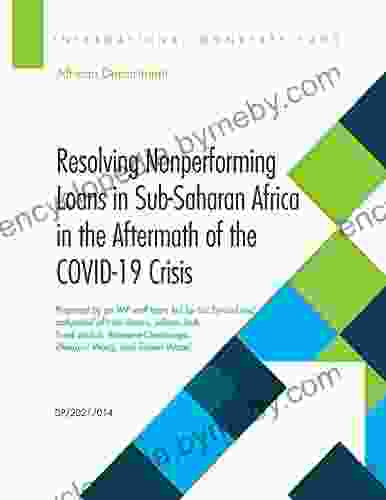Resolving Nonperforming Loans in Sub-Saharan Africa: Strategies for a Post-Pandemic Recovery

5 out of 5
| Language | : | English |
| File size | : | 5305 KB |
| Text-to-Speech | : | Enabled |
| Screen Reader | : | Supported |
| Enhanced typesetting | : | Enabled |
| Word Wise | : | Enabled |
| Print length | : | 135 pages |
The COVID-19 pandemic has had a significant impact on the financial sector in Sub-Saharan Africa. Nonperforming loans (NPLs) have increased substantially, posing a major challenge to financial institutions and economic recovery. This article explores the causes of NPLs, the impact on financial institutions, and the potential consequences for economic recovery. It also provides insights into strategies for resolving NPLs and promoting a post-pandemic recovery.
Causes of NPLs in Sub-Saharan Africa
The increase in NPLs in Sub-Saharan Africa is due to a combination of factors, including:
* Economic slowdown: The pandemic has led to a sharp decline in economic activity, reducing businesses' ability to repay loans. * Job losses and income reduction: The pandemic has resulted in widespread job losses and income reduction, making it difficult for individuals to repay personal loans. * Credit expansion: Prior to the pandemic, many banks in Sub-Saharan Africa had expanded their lending portfolios, resulting in an increase in riskier loans. * Weak regulatory frameworks: Some countries in Sub-Saharan Africa have weak regulatory frameworks for the financial sector, which can contribute to NPLs.
Impact of NPLs on Financial Institutions
NPLs have a significant impact on financial institutions, including:
* Reduced profitability: NPLs reduce banks' profitability by consuming capital and reducing income. * Increased risk: NPLs increase banks' risk profile, which can make it more difficult to attract investors and lenders. * Reduced lending capacity: To comply with regulatory requirements, banks may have to reduce their lending capacity to offset the impact of NPLs.
Potential Consequences for Economic Recovery
High levels of NPLs can have a negative impact on economic recovery, including:
* Reduced investment: Banks with high levels of NPLs may be reluctant to lend to businesses, which can reduce investment and economic growth. * Increased cost of borrowing: Banks may increase interest rates or require more collateral from borrowers to compensate for the increased risk of NPLs. * Reduced access to credit: Businesses and individuals may have difficulty accessing credit due to banks' reduced lending capacity and stricter lending criteria.
Strategies for Resolving NPLs
There are a number of strategies that can be used to resolve NPLs, including:
* Loan restructuring: Banks can work with borrowers to restructure loans, extending the repayment period or reducing the interest rate. * Debt write-offs: In some cases, banks may decide to write off NPLs, which means that the debt is forgiven. * Asset recovery: Banks can sell or lease collateral that has been pledged against NPLs. * Legal action: As a last resort, banks may pursue legal action to recover debts.
Promoting a Post-Pandemic Recovery
In addition to resolving NPLs, there are a number of other measures that can be taken to promote a post-pandemic recovery in Sub-Saharan Africa, including:
* Fiscal stimulus: Governments can provide fiscal stimulus to support businesses and individuals, which can help to reduce NPLs and promote economic growth. * Regulatory reforms: Governments can implement regulatory reforms to strengthen the financial sector and reduce the risk of future NPLs. * Investment in infrastructure: Investment in infrastructure can create jobs and boost economic activity, which can help to reduce NPLs and promote recovery.
The COVID-19 pandemic has had a significant impact on the financial sector in Sub-Saharan Africa, leading to a sharp increase in NPLs. High levels of NPLs can have a negative impact on financial institutions and economic recovery. There are a number of strategies that can be used to resolve NPLs and promote a post-pandemic recovery. Governments and financial institutions should work together to implement these strategies and create a more resilient financial sector that can support economic growth.
5 out of 5
| Language | : | English |
| File size | : | 5305 KB |
| Text-to-Speech | : | Enabled |
| Screen Reader | : | Supported |
| Enhanced typesetting | : | Enabled |
| Word Wise | : | Enabled |
| Print length | : | 135 pages |
Do you want to contribute by writing guest posts on this blog?
Please contact us and send us a resume of previous articles that you have written.
 Book
Book Novel
Novel Page
Page Chapter
Chapter Text
Text Story
Story Genre
Genre Reader
Reader Library
Library Paperback
Paperback E-book
E-book Magazine
Magazine Newspaper
Newspaper Paragraph
Paragraph Sentence
Sentence Bookmark
Bookmark Shelf
Shelf Glossary
Glossary Bibliography
Bibliography Foreword
Foreword Preface
Preface Synopsis
Synopsis Annotation
Annotation Footnote
Footnote Manuscript
Manuscript Scroll
Scroll Codex
Codex Tome
Tome Bestseller
Bestseller Classics
Classics Library card
Library card Narrative
Narrative Biography
Biography Autobiography
Autobiography Memoir
Memoir Reference
Reference Encyclopedia
Encyclopedia Robert A Cutietta
Robert A Cutietta Abbas Kazerooni
Abbas Kazerooni William L Shirer
William L Shirer Abby Franquemont
Abby Franquemont Jeremiah Lynch
Jeremiah Lynch Mike Lyon
Mike Lyon Three Over Eight Learning
Three Over Eight Learning A A Villescas
A A Villescas Adam Freeman
Adam Freeman Julie Schwartz Gottman
Julie Schwartz Gottman Margaret Walker
Margaret Walker Jasmine Shao
Jasmine Shao Jeff Finley
Jeff Finley Daniel Mathews
Daniel Mathews Adam Galinsky
Adam Galinsky 2013th Edition Kindle Edition
2013th Edition Kindle Edition Aaron Chapman
Aaron Chapman Bobby Orr
Bobby Orr A L Long
A L Long Manly P Hall
Manly P Hall
Light bulbAdvertise smarter! Our strategic ad space ensures maximum exposure. Reserve your spot today!

 Quentin PowellUnlocking the Past: A Journey Through the John Prince 1796-1870 Collection of...
Quentin PowellUnlocking the Past: A Journey Through the John Prince 1796-1870 Collection of...
 Haruki MurakamiThe Oxford Handbook of Cuneiform Culture: A Gateway to Ancient Mesopotamia's...
Haruki MurakamiThe Oxford Handbook of Cuneiform Culture: A Gateway to Ancient Mesopotamia's... Bernard PowellFollow ·3.3k
Bernard PowellFollow ·3.3k Alexander BlairFollow ·8k
Alexander BlairFollow ·8k Isaac AsimovFollow ·15.9k
Isaac AsimovFollow ·15.9k Mark TwainFollow ·16.6k
Mark TwainFollow ·16.6k Miguel de CervantesFollow ·7k
Miguel de CervantesFollow ·7k Blake BellFollow ·15.4k
Blake BellFollow ·15.4k Leon FosterFollow ·10.9k
Leon FosterFollow ·10.9k Carlos DrummondFollow ·6k
Carlos DrummondFollow ·6k

 Timothy Ward
Timothy WardFearless Painting for True Beginners: Learn to Create...
Unlock the Joy of...

 Fernando Pessoa
Fernando PessoaProven 12-Step Program for Financial Peace of Mind:...
Are you struggling with...

 Chinua Achebe
Chinua AchebeLayers Colors Desire: Layers Colors Thoughts Mystery
A Literary Labyrinth...

 Fernando Bell
Fernando BellUnearth Hidden Treasures: Journey Through "Secondhand...
Prepare to embark on an extraordinary...

 Caleb Carter
Caleb CarterSymbolic Messages Garage Sale Mysteries: Unveiling the...
Welcome to the extraordinary world of the...

 Nikolai Gogol
Nikolai GogolTravels in the Billion Dollar Trash Trade: Uncovering the...
Ỡ In his...
5 out of 5
| Language | : | English |
| File size | : | 5305 KB |
| Text-to-Speech | : | Enabled |
| Screen Reader | : | Supported |
| Enhanced typesetting | : | Enabled |
| Word Wise | : | Enabled |
| Print length | : | 135 pages |








